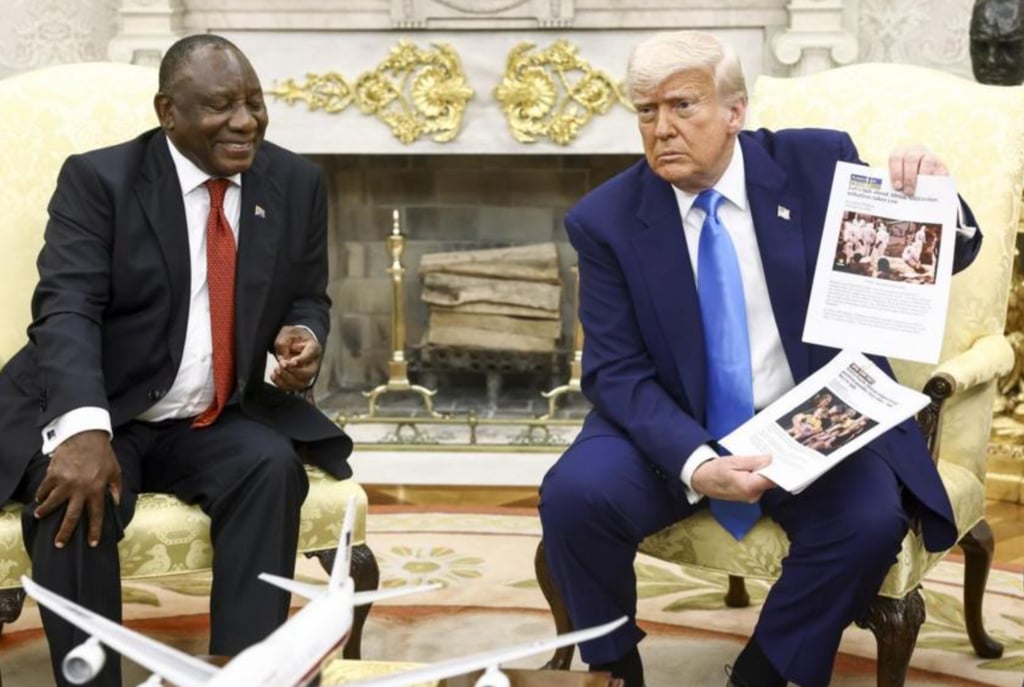The Truth Behind Trump's Oval Office Showdown with South Africa
5/22/20253 min read


The Truth Behind Trump's Oval Office Showdown with South Africa
In a dramatic turn of events during a recent Oval Office meeting, President Donald Trump confronted South African President Cyril Ramaphosa with a video purportedly showing 1,000 roadside graves of dead white South Africans. This bold move was intended to underscore Trump's claims of a "white genocide" in South Africa, a narrative that has sparked intense debate both domestically and internationally. However, the video in question was later revealed to be a political demonstration rather than evidence of actual graves, raising questions about the accuracy of Trump's information and the motivations behind his actions.
The Context of the Meeting
The meeting between Trump and Ramaphosa was part of a broader discussion on trade and international relations. However, it quickly deviated when Trump played the video, claiming it depicted the dire situation of white farmers in South Africa. This action was not isolated; it came amidst a backdrop of escalating tensions between the U.S. and South Africa. Trump had previously criticized South Africa's land reform policies, accused the country of racial discrimination against white citizens, and even offered refugee status to white South Africans, further straining diplomatic relations.
Dissecting the Claims
The video Trump presented was meant to support the controversial claim of a "white genocide" in South Africa. This narrative suggests that white farmers are being disproportionately targeted in a wave of violence. However, multiple sources, including media outlets like CNN and BBC, and analysts, have discredited this claim. They argue that farm attacks in South Africa are part of a broader crime problem affecting all races, rather than a racially motivated genocide.
The video itself, as pointed out by critics like Ed Krassenstein on X, was not of actual graves but a political statement made to highlight violence against farmers. This misrepresentation is significant because it fuels a narrative that lacks factual basis, potentially influencing public opinion and policy decisions based on false premises.
The Broader Implications
This incident is not just about a single video or meeting; it reflects deeper issues in international relations, media consumption, and the spread of misinformation. Trump's actions can be seen as an attempt to leverage domestic political support by tapping into fears and prejudices, a tactic that has been criticized for its potential to harm diplomatic ties and perpetuate racial tensions.
Moreover, the event highlights the challenges of verifying information in an era where social media and rapid news cycles can amplify unverified claims. It also underscores the importance of international cooperation and the need for leaders to engage in dialogue based on facts rather than rhetoric.
The Role of Media and Public Perception
The reaction to Trump's actions was swift and polarized. Supporters on platforms like X praised Trump for his boldness, with some calling it a "genius" move. Critics, however, condemned it as a reckless spread of misinformation. This divide illustrates how media consumption shapes public perception, often leading to echo chambers where conflicting narratives are rarely reconciled.
The involvement of figures like Elon Musk, who has influenced Trump's stance on South Africa, adds another layer to the story. Musk's criticism of South Africa's policies and his role in the administration's decisions reflect how personal biases can impact global politics.
Conclusion: A Call for Critical Engagement
The Oval Office showdown with South Africa is a stark reminder of the power of narrative in shaping reality. It challenges us to question the sources of our information, the motives behind political actions, and the consequences of spreading unverified claims. As global citizens, we must demand transparency and accuracy from our leaders and media.
Thought-Provoking Questions:
How can we ensure that international relations are based on factual evidence rather than political narratives?
What role should social media platforms play in verifying information before it reaches a global audience?
How can countries like South Africa counter misinformation that affects their international standing and domestic policies?
This incident is a case study in the intersection of politics, media, and truth, urging us all to engage more critically with the information we consume and share.
hello@boncopia.com
+13286036419
© 2025. All rights reserved.